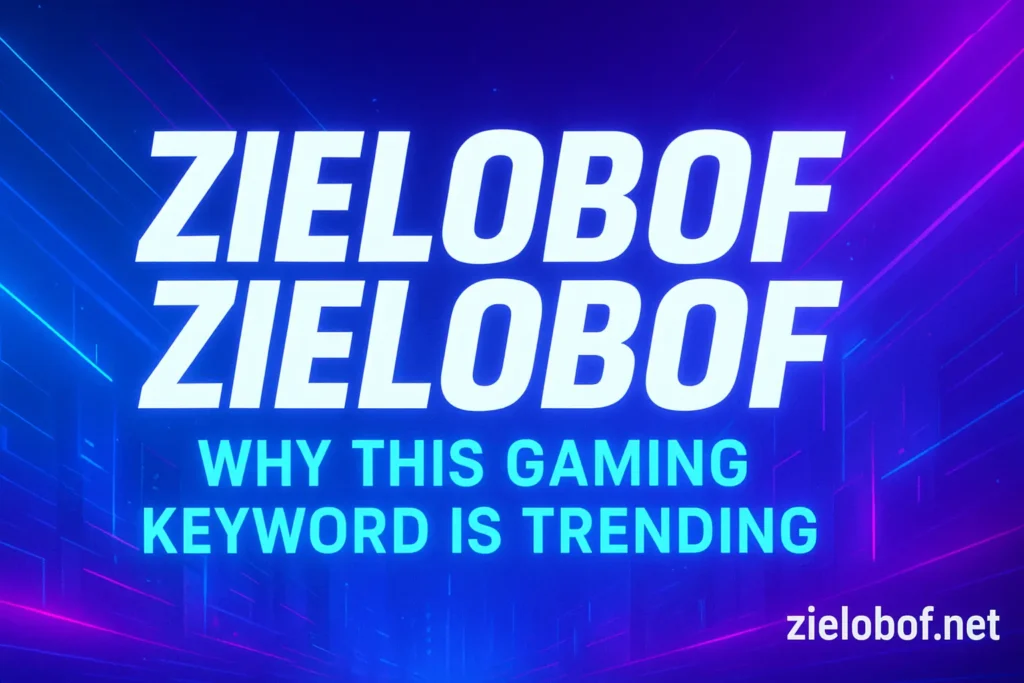Every few months, gaming culture gives birth to a word or phrase that captures attention across forums, social platforms, and live streams. Recently, that phrase is Zielobof Zielobof. At first glance, the term looks unusual, even random. Yet, it is exactly this oddity that makes gamers and creators curious.
Why has this keyword started trending, and what does it mean for the future of gaming communities? To understand its rise, one must explore how language evolves within digital spaces and why gamers adopt specific expressions.
Read also: What Is Zielobof Cod and Why Is Everyone Talking About It?
The Origin Story Behind Zielobof
Like many viral gaming terms, Zielobof does not have a single clear source. Some gamers claim it first appeared during late-night streaming sessions when a player blurted out a combination of syllables that caught on as an inside joke. Others point to modding communities where Zielobof surfaced as a placeholder name for experimental maps or characters.
Regardless of its starting point, what matters most is how players adopted it. Once the word began appearing in Twitch chats, Discord servers, and meme pages, it transformed from a quirky sound into a recognizable signal of belonging.
Why Zielobof Resonates With Gamers
Gaming thrives on shared identity. Players invent slang that outsiders cannot immediately decode, building tight bonds through exclusive vocabulary. Zielobof fits perfectly into this pattern. It has no fixed meaning, which allows each community to interpret it freely.
For some, it represents an epic fail during a boss battle. For others, it acts as a cheer when teammates pull off an unexpected win. Its versatility gives gamers freedom to attach personal emotions, ensuring that Zielobof feels relevant in multiple contexts.
Social Media and the Growth of Zielobof
No modern trend gains traction without social platforms amplifying it. Zielobof gained momentum when short-form video creators used it in captions and hashtags. TikTok clips featuring dramatic gameplay moments tagged with Zielobof began to spread, while Reddit threads debated whether the word had hidden meaning.
Twitter, now known as X, saw meme accounts pairing Zielobof with absurd images, fueling its humor value. As more creators joined the trend, search volume for the keyword skyrocketed, proving that algorithms reward quirky phrases that encourage engagement.
Zielobof as a Digital Meme Currency
Gamers treat language as cultural currency. A single word can carry weight similar to an inside joke that only community members understand. Zielobof evolved into a digital meme currency because it delivers humor without explanation. Viewers laugh not because they fully understand the term, but because everyone else laughs. This shared reaction reinforces belonging.
By repeating Zielobof, users signal that they are part of the conversation. In online ecosystems where attention spans are short, such shorthand expressions create quick recognition and emotional connection.
The SEO Impact of Zielobof
Interestingly, Zielobof has not only influenced social media but also shaped search behavior. Content creators, bloggers, and gaming journalists recognize that players search for the keyword out of curiosity. Websites that optimize articles around Zielobof see spikes in organic traffic. YouTube channels inserting Zielobof into titles gain clicks from audiences eager to decode the mystery.
Even e-commerce platforms selling gaming gear experiment with Zielobof as a branding hook. This demonstrates how internet culture now drives real business decisions through SEO.
Why Zielobof Matters Beyond Gaming
While Zielobof originated in gaming circles, its cultural footprint extends further. Non-gaming influencers adopt it as part of comedy sketches. Musicians sample it in lyrics to capture viral energy. Digital marketers use it in ad campaigns to target younger audiences familiar with meme culture.
This crossover effect proves that Zielobof embodies a larger truth: modern internet trends are fluid, escaping their original context and reshaping communication in unexpected spaces.
Psychological Appeal of Random Words
To understand Zielobof’s staying power, one must examine psychology. Human brains are wired to notice novelty. Random syllables like Zielobof stand out against ordinary language. They disrupt patterns, making people pause, laugh, or share.
This disruption gives the word memetic power. Because it resists easy definition, Zielobof invites interpretation. That open space for meaning allows communities to project their creativity, ensuring the word remains fresh rather than fading as a stale meme.
Zielobof and the Future of Gaming Language
Gaming language evolves quickly. Yesterday’s buzzwords can vanish overnight, replaced by new phrases. Yet Zielobof may endure longer because of its flexibility. Unlike words tied to a specific game mechanic or trend, Zielobof floats freely, adaptable to any title or genre.
Whether players compete in shooters, explore open-world adventures, or collaborate in role-playing campaigns, they can insert Zielobof seamlessly. Its universal tone ensures longevity, allowing it to survive beyond one gaming season.
Community Voices on Zielobof
Gamers themselves continue to shape how Zielobof is used. Streamers often engage audiences by asking viewers to spam Zielobof in chat during clutch moments. Forum discussions highlight how the word breaks tension during heated debates.
Some players even design fan art and mods using Zielobof as a character name. This active participation transforms a simple keyword into cultural property. The community feels ownership, which guarantees that Zielobof remains alive through constant reinvention.
Brands and Commercial Adoption
Whenever a cultural phenomenon grows, brands take notice. Esports teams experiment with Zielobof in promotional material to connect with younger fans. Merchandise shops sell T-shirts featuring the phrase in bold neon fonts.
Gaming accessory companies insert Zielobof into limited edition product lines. By leveraging the popularity of the word, brands hope to capture the energy of grassroots culture. This commercialization does not always succeed, but it demonstrates the recognition of Zielobof’s marketing potential.
Ethical Considerations in Trend Usage
Although Zielobof seems harmless, ethical reflection matters. When corporations exploit grassroots language without respecting community origins, fans may feel alienated. Authentic engagement requires crediting the gamers who popularized Zielobof, rather than reducing it to a disposable slogan.
Sustainable cultural adoption depends on transparency, respect, and collaboration with communities that birth these trends. By honoring the collective creativity behind Zielobof, brands can strengthen trust instead of risking backlash.
Conclusion
Zielobof Zielobof may look like random letters stitched together, yet its cultural journey proves otherwise. It embodies the creativity, humor, and shared identity that define modern gaming. From Twitch chats to TikTok videos, from SEO strategies to merchandise, Zielobof has traveled far beyond its mysterious origins. Whether it fades tomorrow or becomes a permanent fixture in gaming language, its story illustrates how internet culture transforms nonsense into meaning.
In the end, Zielobof is not just a word. It is proof that gamers hold the power to shape digital culture, influence search trends, and inspire global conversation all through a playful combination of sounds.
FAQs
Q1: What is Zielobof Zielobof in gaming?
A: Zielobof Zielobof is a trending gaming keyword used as a meme or slang with flexible meaning in different communities.
Q2: Where did Zielobof Zielobof come from?
A: It likely began as a random phrase in streams or mods and spread across Twitch, TikTok, and gaming forums.
Q3: Why is Zielobof Zielobof popular?
A: Its randomness, humor, and adaptability make it easy for gamers to use in many contexts, fueling its viral growth.
Q4: How is Zielobof Zielobof used today?
A: Gamers use it in chats, memes, fan art, and even merchandise as a playful cultural symbol.
Q5: Will Zielobof Zielobof last as a trend?
A: Its open-ended meaning gives it flexibility, suggesting it could remain relevant longer than most gaming buzzwords.


